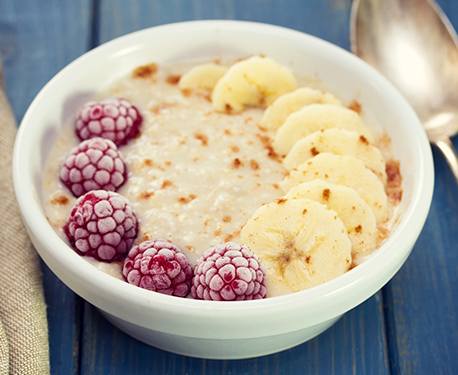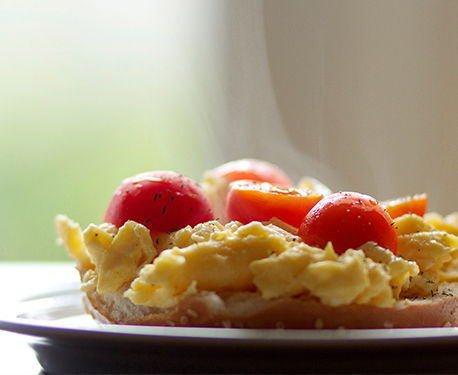5 easy breakfast ideas in pregnancy
This advice is for you if your BMI was in or over the recommended range before pregnancy. If you have suffered from disordered eating in the past or if your BMI is in the underweight range the information on this page may be more helpful for you.
Breakfast gives you a much-needed energy boost after a long stretch of ‘fasting’ during the night. Get some healthy breakfast ideas here.
Why is breakfast important?
Skipping breakfast can make us snack on high-calorie foods during the day more. Studies suggest that people who skip breakfast also tend to be less active. If you eat a healthy breakfast, you’re more likely to be a healthy weight and have a lower risk of developing certain health conditions. These include diabetes, high blood pressure and cardiovascular disease.
If you find it difficult to eat in the morning, start with small portions and gradually, your appetite will increase.
If you have pregnancy sickness, having 6 small meals a day may help help ease symptoms.
What makes a healthy breakfast?
Breakfast is a time to take in important nutrients for you and your baby. These include B vitamins, folate, calcium and vitamin C.
A healthy breakfast should contain a combination of the following food groups.
Fibre-rich carbohydrates
Carbohydrates give us energy and fuel for the day ahead. They are also a valuable source of fibre to protect gut health. Breakfast carbohydrates could include:
- wholegrain bread
- low sugar/ high fibre breakfast cereal (try to have cereal that contains 5g of sugar per 100g or less)
- porridge oats.
At the start of my pregnancy when I felt funny in the mornings, a glass of fruit juice with ice and some cereal was a good way to start the day, even if I didn't feel like eating.
Protein
Protein is important for growth and repair in the body. Including a protein source with your breakfast can help you feel fuller for longer. Protein sources for breakfast could include:
- yoghurt
- baked beans
- milk (or plant-based milk)
- eggs
- nuts and seeds.
Fruit or vegetables
Fruit and vegetables are great sources of vitamins, minerals and fibre. Choices for breakfast could include:
- tomato
- mushroom
- berries
- apples
- bananas.
You can add these to your normal breakfast or blitz them up into a smoothie.
Top tip!
As well as having a healthy, balanced diet, remember there are some important supplements to take during pregnancy too. Find out more about pregnancy supplements.
5 easy pregnancy breakfast ideas
Here are 5 easy breakfast ideas that combine sources of fibre, protein and fruits or vegetables to help you start your day.
Porridge and fruit
.

Sprinkle sliced banana or berries onto your porridge.
If you don’t have much time in the morning, try making overnight oats the night before:
Put the oats in a container and add milk, yoghurt and some sliced, frozen or dried fruit.
Put in the fridge ready for the next morning.
Use plant-based milk and yoghurt for a vegan-friendly option.
Be aware that a standard serving size of oats is 30g which is about 2 to 3 tablespoons (dried). This doesn’t look like much, but when you add milk or water they expand more than you might expect.
Keep it simple with some toast and a glass of milk

If you are having morning sickness, keeping it simple with toast may help. Bread has carbohydrates to keep your energy levels up and is easy to nibble if you aren’t feeling hungry. Spread with peanut butter or marmite and add a glass of milk for a portion of dairy.
Smoothies

Smoothies are perfect for a busy morning. You can keep your favourite chopped up fruits and vegetables in your freezer ready to add to your blender. Then just add some milk and plain yoghurt and blitz!
Scrambled eggs with a wholemeal bagel

You can have lightly cooked eggs as long as they are Red Lion standard. Try scrambled eggs with grilled tomatoes and wholemeal bagel for a breakfast. This option includes nutrients, slow-release carbohydrates and plenty of protein.
Yoghurt and toppings

Top plain yoghurt with any fresh or tinned-in-juice fruit you have and add a handful of granola. Check food labels because some types of granola include a lot of added sugar.
Find out about more foods to eat when pregnant.
NHS (2022). Eating a Balanced Diet. [online] nhs.uk. Available at: https://www.nhs.uk/live-well/eat-well/how-to-eat-a-balanced-diet/eating-a-balanced-diet/ [Accessed 28 Aug. 2024]. (Page last reviewed: 29 July 2022 Next review due: 29 July 2025).
NHS (2023) Have a healthy diet in pregnancy. Available at: https://www.nhs.uk/conditions/pregnancy-and-baby/healthy-pregnancy-diet/ (Accessed 4 April 2024) (Page last reviewed 21/04/2023. Next review due 21/04/2026)
NHS (2023). Morning sickness. [online] nhs.uk. Available at: https://www.nhs.uk/start-for-life/pregnancy/morning-sickness/ [Accessed 28 Aug. 2024].
NHS (2023) Vitamins, supplements and nutrition in pregnancy. Available at: https://www.nhs.uk/pregnancy/keeping-well/vitamins-supplements-and-nutrition/ (Accessed 4 April 2024) (Page last reviewed 01/09/2023. Next review due 01/09/2026)
Ofori-Asenso R, Owen AJ, Liew D. (2019) ‘Skipping Breakfast and the Risk of Cardiovascular Disease and Death: A Systematic Review of Prospective Cohort Studies in Primary Prevention Settings’. J Cardiovasc Dev Dis. 2019;6(3):30.
The Association of UK Dieticians (2023) Healthy Breakfast. Available at: https://www.bda.uk.com/resource/healthy-breakfast.html (Accessed 4 April 2024) (Page last reviewed 07/2023)
Yoshimura E, et al. (2017). ‘Skipping breakfast reduces energy intake and physical activity in healthy women who are habitual breakfast eaters: A randomized crossover trial’. Physiology & Behavior. 15;174:89-94.
Related content for you
-
Read more about '10 healthy snacks for added energy in pregnancy '
10 healthy snacks for added energy in pregnancy
-
Read more about '7 simple dinner recipes '
7 simple dinner recipes
-
Read more about '7 easy pregnancy lunch ideas '
7 easy pregnancy lunch ideas

